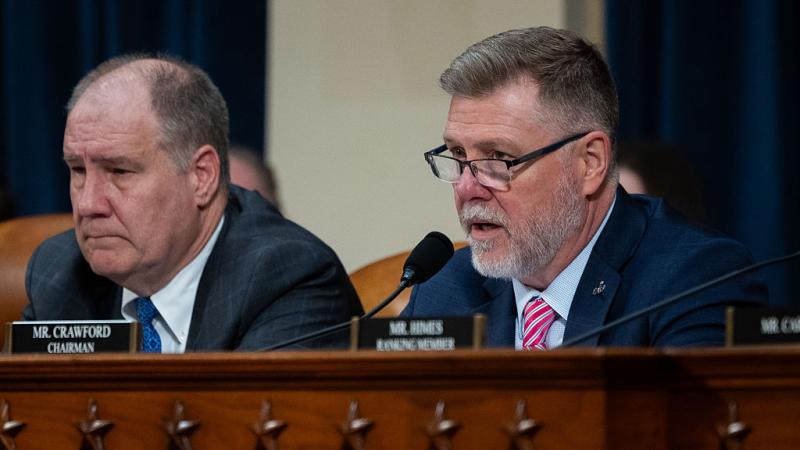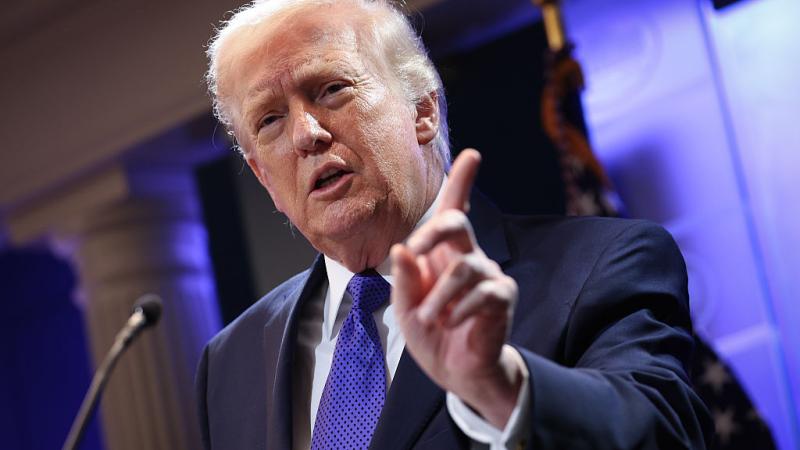Requiring photo IDs to vote used to be bipartisan, now Democrats call it 'Jim Crow'
'We propose a uniform system of voter identification based on the 'REAL ID card' or an equivalent for people without a drivers license,' a 2005 bipartisan commission stated.
Top Democrats are describing voter identification requirements as as return to "Jim Crow" discrimination. But it wasn't that long ago when voter photo IDs enjoyed a bipartisan embrace and Congress' main investigative arm concluded the vast majority of registered voters already had the necessary identification.
"Depending upon the study, estimated ownership rates among registered voters ranged from 84 to 95 percent," a 2012 Government Accountability Office report concluded, adding that white and black Americans have roughly similar access to photo IDs to use for voting.
The photo ID debate is back in full bloom as Congress and some battleground states appear on a collision course.
Congressional Democrats are pushing the For the People Act of 2021 — passed by the House and pending in the Senate. It would empower voters to avoid photo identification requirements in certain states.
Georgia, meanwhile, enacted a new election law extending its photo ID requirement to absentee ballots, which Democrats and voting rights groups have criticized. President Biden referred to it as "Jim Crow in the 21st Century." Voting rights activists are calling it "Jim Crow 2.0." In the past, former President Barack Obama has referred to requiring a photo ID to vote as a barrier for minorities.
The House-passed For the People Act, or H.R. 1, is a federal election reform bill that would allow citizens to provide a sworn written statement to meet identification requirements for voting. Republicans oppose that provision of the bill along with other election reforms in the legislation. West Virginia Democratic Sen. Joe Manchin said the bill, which is pending in the Senate, should not move forward unless it has bipartisan support.
Americans are currently required to show identification to purchase alcohol or to board a plane. In some states, individuals are required to show ID to receive a COVID-19 vaccination. The Biden administration is reportedly working with the tech industry on creating a vaccination passport system for traveling.
"Considering that Democrats want to require vaccine IDs for people to conduct their basic daily activities, they now have zero grounds to object to voter ID laws," House Minority Whip Steve Scalise (R-La.) recently said.
Alabama Republican Rep. Mo Brooks said opposing voter ID laws assumes African Americans are not capable of obtaining a state ID.
"They, the socialist Democrats, are arguing that Asian Americans, Hispanic Americans, Caucasian Americans, somehow have the ability to vote, have the ability to get photo ID, but the socialist Democrats are in effect arguing that somehow or another African Americans are inferior and unable to do what other races are doing, therefore, African Americans need to be protected in some fashion and should not be subject to voter identification," he said.
The 2005 Carter-Baker Commission was chaired by former Democratic President Jimmy Carter and former Secretary of State James Baker from the administration of George H.W. Bush. The commission's 2005 report recommended a "photo ID system for voters designed to increase registration with a more affirmative and aggressive role for states in finding new voters and providing free IDs for those without driver's licenses."
The commission compared the recommended voter ID system to the REAL ID requirement that Congress passed for traveling domestically.
"Second, to make sure that a person arriving at a polling site is the same one who is named on the list, we propose a uniform system of voter identification based on the 'REAL ID card' or an equivalent for people without a drivers license. To prevent the ID from being a barrier to voting, we recommend that states use the registration and ID process to enfranchise more voters than ever," the report recommended.
"States should play an affirmative role in reaching out to non-drivers by providing more offices, including mobile ones, to register voters and provide photo IDs free of charge. There is likely to be less discrimination against minorities if there is a single, uniform ID, than if poll workers can apply multiple standards," the report also read.
The commissioners also suggested "procedural and institutional safeguards to make sure that the rights of citizens are not abused and that voters will not be disenfranchised because of an ID requirement" and proposed that "voters who do not have a photo ID during a transitional period receive a provisional ballot that would be counted if their signature is verified."
The commissioners acknowledged there are "longstanding concerns voiced by some Americans that national identification cards might be a step toward a police state."
"On that note, it is worth recalling that most advanced democracies have fraud-proof voting or national ID cards, and their democracies remain strong. Still, these concerns about the privacy and security of the card require additional steps to protect against potential abuse," read the report.
"There is no evidence of extensive fraud in U.S. elections or of multiple voting, but both occur, and it could affect the outcome of a close election. The electoral system cannot inspire public confidence if no safeguards exist to deter or detect fraud or to confirm the identity of voters. Photo IDs currently are needed to board a plane, enter federal buildings, and cash a check. Voting is equally important," it added.
The commission's report urged states to do more to combat absentee ballot fraud.
According to the 2005 report, "absentee ballots remain the largest source of potential voter fraud. A notorious recent case of absentee ballot fraud was Miami's mayoral election of 1998, and in that case, the judge declared the election fraudulent and called for a new election."
Under the "Absentee Ballot and Voter Registration Fraud" portion of the report, the commissioners wrote that "all citizens who register to vote with a mail-in form, whether that form is actually sent by mail or is instead hand-delivered, should comply with HAVA's requirements or with stricter state requirements on voter ID, by providing proof of identity either with their registration application or when they appear at the polling station on Election Day."
The report noted that this would oblige election offices to "verify the identity of every citizen who registers to vote, whether or not the registration occurs in person."
The commission warned that absentee balloting is "vulnerable to abuse" in several ways.
"Blank ballots mailed to the wrong address or to large residential buildings might get intercepted. Citizens who vote at home, at nursing homes, at the workplace, or in church are more susceptible to pressure, overt and subtle, or to intimidation," the report read.
"Vote buying schemes are far more difficult to detect when citizens vote by mail. States therefore should reduce the risks of fraud and abuse in absentee voting by prohibiting 'third-party' organizations, candidates, and political party activists from handling absentee ballots. States also should make sure that absentee ballots received by election officials before Election Day are kept secure until they are opened and counted," the report also read.
To date, third party groups in many states can legally send pre-filled out absentee ballot applications by mail to registered voters. In the 2020 election cycle, third party groups in Virginia sent more than 500,000 applications out with errors.
"States should consider new legislation to minimize fraud in voter registration, particularly to prevent abuse by third-party organizations that pay for voter registration by the piece," the 2005 commission recommended. "Such legislation might direct election offices to check the identity of individuals registered through third-party voter registration drives and to track the voter registration forms."
Georgia is among the states that require a photo ID to cast a ballot. The state's new election law extends its photo ID requirement to absentee ballots. Democrats have argued that the Georgia law and similar laws suppress the minority vote.
According to a 2012 Government Accountability Office report, white and black Americans had roughly similar access to photo IDs required for voting.
"For example, one study estimated that 85 percent of White registered voters and 81 percent of African-American registered voters in one state had a valid ID for voting purposes," read the report.
In 2006, Carter called for states to require photo IDs in order to vote, saying it would catch the U.S. up with the rest of the world.
"Americans have to remember you have to have the equivalent to what we're requiring to cast a ballot to cash a check or board a plane," Carter reportedly said during the event at The Carter Center.
Despite the Carter-Baker commission's recommendations surrounding voter ID, Carter criticized the election law recently signed into law in Georgia. The Georgia Democrat, however, did not address the photo ID portion of his 2005 report in his statement.
"While our report noted a few good and bad examples of vote-by-mail practices, its main recommendation was that further study of voting by mail was needed," he said in a statement. "In the 16 years since the report's release, vote-by-mail practices have progressed significantly as new technologies have been developed. In light of these advances, I believe that voting by mail can be conducted in a manner that ensures election integrity."
Just the News asked the Carter Center if Carter still thinks there should be a uniform photo ID system for voting in the U.S. but did not receive a response before publication.















